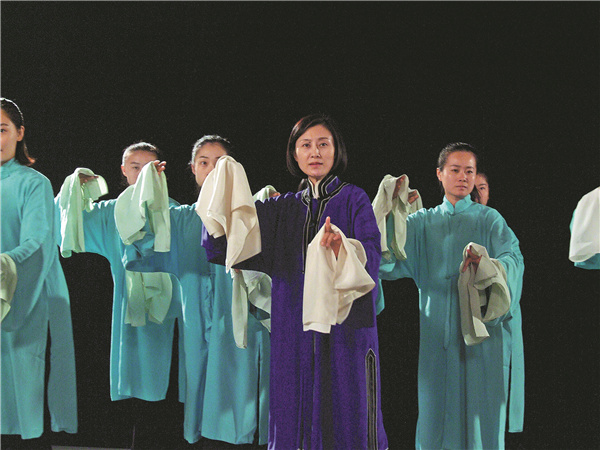

Training under a national star can be grueling, but the path to perfection is possible, Chen Nan reports.
Zhang Huoding, one of China's biggest Peking Opera stars, has been keeping a low profile. Ever since she started teaching at the National Academy of Chinese Theatre Arts in Beijing in 2008, she has spent more time training Chinese Peking Opera students than performing onstage.
In 2016, the academy announced a training program led by Zhang, to recruit Peking Opera actresses from around the country to focus on learning the Cheng School of performance — the style founded by the renowned Peking Opera master Cheng Yanqiu (1904-1958), and which is one of the four major styles of Peking Opera that emerged in the early 20th century.
So far, 18 actresses have been trained by Zhang as part of the program.
Fourteen of them will perform in a show in Beijing on Dec 3 that will include a number of Cheng's classic pieces, such as The Legend of the White Snake and The Jewelry Purse, as well as contemporary Peking Opera pieces performed in the Cheng style, including Jiang Jie (or Sisiter Jiang, a play dedicated to the female martyr, Jiang Zhujun).
According to the National Academy of Chinese Theatre Arts, the show will also be a warm-up celebration to mark the 120th anniversary of Cheng's birth, which will fall in 2024.
"The pieces being staged have been performed by Zhang Huoding herself. She has been teaching us word by word, every gesture and every move," says Lyu Yaoyao, an actress with the China National Peking Opera Company, who will perform excerpts from Huang Shan Lei (Crying in the Deserted Mountains).
The 36-year-old joined Zhang's program in September 2022 and studied the role of Zhang Huizhu, the protagonist of Huang Shan Lei, for months.
Premiered by Cheng in Beijing in 1931, Huang Shan Lei is set against the backdrop of the Ming Dynasty (1368-1644), and tells the story of a once happy family ruined by exorbitant taxes. The main character's husband and father-in-law are arrested because they can't pay the taxes and so she has to pay them herself by weaving cloth, day and night. When the government pushes her for the money, her husband and father-inlaw are forced to go in search of medicinal herbs in the mountains to make more money, and are killed by tigers. With her only son in prison and her mother-in-law dying of a shattered heart, Zhang Huizhu finally flees to the mountains, where she commits suicide.
"Zhang Huoding has played the role many times and shared her experience with me. Zhang Huizhu's emotions gradually change as she loses family members one after another. Zhang Huoding taught me how to use my facial expressions to convey these changes to the audience. From the eyebrows to the lips, every move is carefully choreographed," Lyu says.
Born and raised in Harbin in Heilongjiang province, Lyu learned Peking Opera as a child because her grandfather was a fan of the art form. At first, she studied the performing style of Peking Opera master Mei Lanfang (1894-1961), but learned to perform the Cheng style after coming to Beijing to study at the middle school affiliated to the National Academy of Chinese Theatre Arts in 1999.
"One of my teachers suggested that I should learn it because my voice is deep, which fits the Cheng style. I agreed," says Lyu, who joined the China National Peking Opera Company in 2009 after graduating from the academy . "I watched many of Zhang Huoding's videos and when I started to study with her, I put all my performing experiences aside and started anew from scratch."
Lyu adds that most plays in the Cheng style are tragedies, and the leading female roles are usually those of good wives and good mothers who take care of their family. Compared to these sad roles, the female roles associated with the Mei style are usually those of beautiful women and fairies, with sweet singing voices.